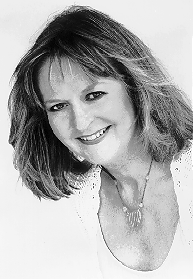Millennium Women and A Cappella
By Morgan Ames
I have been the leader-arranger of an a cappella group (Inner
Voices) for over 15 years and a lot has changed. For instance, a cappella singing
has come back in fashion in the record business, just as it will go out again.
No point worrying about it and I don't think most of us do. When you love voices
suspended by their own weight, all alone, a cappella, you just do.
The path of women vocal arrangers follows the path of evolution
for women generally. If you think you can do it, you can. But you have to acquire
a taste for heartbreak which is to say, hang onto your sense of humor. Most
important of all, build your skills. My experience as a music professional all
these years is that there is no give relative to craft skills, not for women.
Skill breeds respect and without it, professional work is no fun once you're
out of your 20s. It's a good thing too. You spend a lot more time in your career
not young than young. The lion's share of success and artistic satisfaction
comes later, and deepens as you do.
When I hear groups at a vocal faire or whatever, I often wish
they would rethink their arrangements. At the moment, vocal percussion is in
fashion and some groups think that if someone has a mic in his mouth, the song
is arranged. It isn't. Another trap is the wall of sound approach the group
or someone in it picks a time feel (often repetitive), falls into a familiar
chord style and just keeps going. Then: end big and stop. But there is an ocean
of difference between finishing an arrangement and stopping because it's long
enough. A stop happens and a finish is earned.
If you're a woman at the millennium, believe me, craft skills
are the secret. They help build confidence and neutralize intimidation - especially
from the guys. If you're a singer, and the majority of vocal arrangers are,
you already have a good start. Of course, the music style of your group impacts
your arranging choices, but even styles which appear relatively simple, doo
wop for instance, are not. The work of great groups just sounds simple. The
myth of the doo wop group hanging out on the front porch in Philly is pretty
much just that. On the other hand, if you don't know what you're doing, arrangements
can get ridiculously over-complicated, driving everyone in the group crazy and
sucking energy out of the song.
I never start writing an arrangement until I see it in my head.
I kind of meditate on the song, in silence. For me it's important to cast it
like a movie among the brilliant singers in my group. I get a feel pretty quickly
about who should stand out, whose persona fits the lyrics. I'm not afraid of
space. I vary from all-four to one voice to a duet in sixths all in maybe eight
bars. It's called dynamics. Four voices have entirely different weight and color
than two. One singing loudly versus four singing softly lends surprise and dimension.
Here's a good exercise: think of your favorite vocal or background
vocal arrangement of all time (Respect by Aretha Franklin, I Just Want to Stop
by Gino Vannelli, Quiet Place by Take 6, O Little Town of Bethlehem on Vince
Gill's recent Christmas album). Then do some serious analysis. Why do you love
it? Why in detail. Really go there. Arranging is about problem solving, note
by note. I grew up doing this obsessively, and still do it. I have listened
to the first Take 6 album hundreds of times and still learn from it. Gene Puerling
is the Bach of vocal arrangers as far as I'm concerned, and Primarily a Cappella
carries both his arrangements and the CDs of his groups, Singers Unlimited and
The Hi-Los. Study him and you don't need school.
One more tip: don't ignore those, uh, well, those funky little
spots in the arrangement that never quite worked. What separates the pros from
the non-pros is the polishing, the finishing up, the unglamourous part.
You get to love the process eventually because of what it gives
back to you. You may find, like me, that the more you arrange (i.e., solve problems
second to second, put out fires caused by the last chord you wrote, etc.) the
more you fall in love with the art.
 |
Morgan Ames
Morgan was singing and playing in clubs at 16, wrote a hit at 18, ("Far
Side of the Hill") and another later with Dave Grusin (TV's Baretta's
Theme). She learned the business from Quincy Jones, for whom she worked
for three years. She co-produced the double Grammy winning album "Diane
Schuur and the Count Basie Orchestra" and is an established session
singer and vocal arranger who has recorded with Kenny Loggins, Wynonna,
Vanessa Wiliams, David Foster, has written vocal arrangements for Al Jarreau,
Dionne Warwick, Bette Midler, Yanni, David Benoit, has performed with
Paul McCartney, Chaka Kahn, Jerry Butler, Doobie Brothers, Patti Austin,
has sung in films such as Sister Act I & II, Quest for Camelot, Amistad,
League of Their Own. Her songs have been recorded by Roberta Flack, Shirley
Horne, Barbara Mandrell, Bob James, Peggy Lee, etc. Morgan currently performs
with Inner Voices.
Morgan can be reached at Morgan7@gte.net
|
